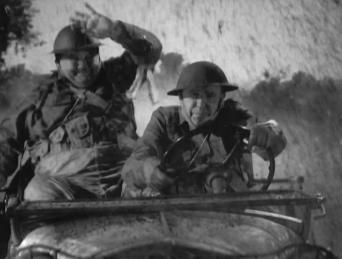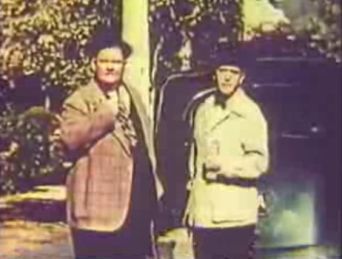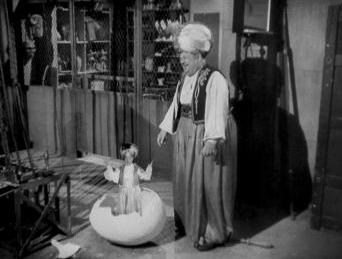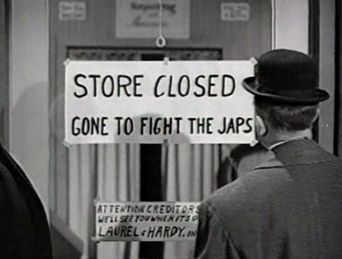(May-August 1941, 74m) Director: Monty Banks Released: Twentieth Century-Fox, October 10, 1941  From August 1940 Stan and Ollie had been touring a sketch, 'How To Get A Driver's License', and had generally settled down into domesticity, with Stan remarrying his second wife, Virginia Ruth, in January 1941. Sadly, in front of the cameras things didn't go according to plan: both stars had believed that they'd enter a new dawn of creative freedom. The reality was that they'd unwittingly entered Fox's 'B Movie' wing, and were hired as paid actors to say scripted lines. If Stan had had issues with Hal Roach over his creative input where he was unofficial writer, director and editor, then how would he feel when he was expected to just turn up and read scripted lines on cue? In Stan's own words talking to the New York Times in 1951 then: 'All those old [Hal Roach] movies you see on television were written and supervised by us. Naturally, it breaks your heart when they send you a script Friday night and say you're to start shooting Monday morning. We're not used to that kind of treatment.' And yet, watching Great Guns again, then I surprise myself by saying... it's not actually that bad. Sure, when Fox promoted their Laurel and Hardy output on home video with a trailer announcing 'four of their best-loved movies', they were flouting the rules of the Trades Descriptions Act, but this is still within the general downward range of their later Roach features rather than a plummet from them. Put it next to Way Out West and it's a huge gulf in quality. But put it next to something like the decline of Saps At Sea and the difference is not so vast. While the introduction of a romance between secondary characters isn't that compelling, Edmund MacDonald (who would sadly die of a brain haemorrhage ten years after the film was made, aged just 43) has a pretty good rapport with the boys as Sergeant Hippo. The two stars even get to cry, 'take it big', look to camera and do some surrealist comedy here and there. They're slightly out of character, yet nowhere near as out of character as I'd recalled. Even their aged appearance isn't as shocking when watched directly after Saps At Sea where the make-up had got ridiculously thick to hide their wrinkles. However, the big downturn comes around fifteen minutes into the film when two men steal Stan and Ollie's dinner. In Great Guns Oliver Hardy is a declawed tom cat, the once pompous braggadocio now perfectly content to be subservient to all around him, Stan the only man he now bullies. When he confronts men stealing his food, he gets rude remarks made about his weight, then leaves. No reciprocal destruction, no attempt at retaliation... just a man put in his place and accepting of his fate. Perhaps the most galling moment of all comes when Sergeant Hippo has his face blackened in an explosion, Stan suggesting 'Look, they've assigned us a porter.' Much 'hilarity' ensues, after which the Colonel demands, 'what are you trying to do, put on a Minstrel show?' For their 20s and 30s output it was a na�ve gesture, a world away, but in the 40s it was a different matter, particularly as the 'joke' comes not from Stan's ignorance but from cognisant racial mockery. Also of note are the many references I've read to the film being a lifeless rip-off of the Abbott and Costello movie Buck Privates, released in January 1941. As I find Abbott and Costello as funny as root canal surgery I can neither confirm or deny this, though the duo were inexplicably popular and bigger box office stars than our own Stan and Ollie were throughout the forties. However, one cross-team reference that does creep in is that between the boys and the Marx Brothers. The line about 'I haven't eaten in three days: yesterday, today and tomorrow!' is said by Chico in Monkey Business and Stan in One Good Turn, both from 1931. The fact that this amusing line got dusted down a decade after its sell-by date perhaps says a lot about Great Guns. Back to that 1951 New York Times interview and Hardy was positive about Great Guns, although he disparaged the rest of the Fox output: 'The first one, ''Great Guns'', was funny and it made money. After that they never gave us stories - or casts. [...] Brynie Foy, our producer, never read our scripts. ''You boys don't need a story,'' he'd tell us. ''Your pictures are making money; what more do you want?'' We tried to tell them, ''If bad ones make money, what would a good one do?''' Expectation is everything, and if you watch Great Guns expecting to see a great Laurel and Hardy movie you'll be disappointed. But put it on expecting to see Stan and Ollie with their souls ripped out and you might think 'hey... they actually do act like they still care some of the time'. You might even be surprised to find they're still funny on occasion, even in this b-level environment... the bit with them getting the Colonel to take their photograph is amusing, right? And sure, the guest cast get out-acted by a crow, but they're not on screen as long as you might remember, and glimpses of the real Stan and Ollie still shine through. In fact, if I wasn't a miserable old curmudgeon with a vague feeling that I've been way too soft on this film then I'd maybe give it three stars. But I am and I have, so...   (November 1941, 5m) Director: Charles McDonald  Presented by the Department of Agriculture Forest Service and narrated by Pete Smith, this short propaganda war film is the only chance this side of The Rogue Song to see Stan and Ollie in colour. Although home movie footage of the duo exists on YouTube, this was the only professional work featuring them both not in black and white, and features the pair silently producing props from their pockets. Shot on the Fox backlot, the concept is that everyday objects contain wood that can help towards the war effort. It's not really a laugh a minute and the sarcastic narration jars a little with Stan and Ollie's more innocent humour, but it's worth a look as a curio.    (January-April 1942, 68m) Director: Alfred L Werker Released: Twentieth Century-Fox, August 7, 1942  Oliver Hardy had turned fifty as A-Haunting We Will Go was being made, and the age of both stars is really beginning to show at this stage. With all due respect to Ollie, in the films of the 1940s his face begins to get submerged into his head as the excess weight he piles on throughout the decade makes him more and more unrecognisable. Compare the way he looks in Busy Bodies with the way he looks in any of the Fox movies and it's a completely different person, heartbreakingly so. One of the (few? only?) advantages that the Fox movies have over the Hal Roach ones is that the quality of the existing prints are not only much finer but they've been restored for DVD far better. Obviously age has a factor in this, with A-Haunting We Will Go being made fifteen years after some of the silents, but you'll get no dirt on the picture or missing frames from these movies. The less kind among you might feel that this is unfortunate, and certainly A-Haunting We Will Go could have done with some missing frames. 68 minutes worth to be precise. If you ask anyone what their favourite Laurel and Hardy plot was, the chances are you'll hear them say 'the one where a load of tedious gangsters try and cross states by hiding their leader in a coffin and it gets mixed up with a magician's stage props. Stan and Ollie get involved in the magician's act dressed up as stereotyped Turks and Stan ends up really tiny in an egg.' When the person you've asked finishes wiping away tears of laughter at the sheer hilarity of it all, you might ask them for one more part that makes A-Haunting We Will Go such a laugh riot. 'Well,' they'll say, barely able to control themselves with mirth, 'what about that part with ''inflato'', where they think they've brought a money-making machine and it turns out they've been conned?' It's a rib-tickling concoction to be sure, and add to this a romance sub-plot and you've got celluloid gold on your hands. I don't even know who Laurel and Hardy are in this film. Not stars of their own picture, that's for sure. Over twenty minutes (count 'em!) of the movie's runtime are given up to non-Stan and Ollie material. That's almost a third of their own movie not featuring them actually in it. Add to this Dante, a real-life magician with real-life acting skills (kinda likeable though) and a plot that doesn't even get resolved by the boys... it's a wash out, an overtly complex hokey plot brought to life with dead-headed 'comedy' with Stan and Ollie to prop it up. In most of these Fox movies then there really are only three 'jokes' with Stan and Ollie: 1. They're really not very bright. Tee hee. Though instead of them doing funny things and getting into funny situations it'll normally involve some charisma vacuum scolding them for their low intelligence. 'Hey, you two mugs, why are you two guys so dumb?' 'We're terribly sorry sir, please forgive us for our inferior nature.' 2. Oliver Hardy is fat. Not comically overweight, or having his pompous nature occasionally pricked by using this as a comic barb against him. No, Ollie is never afforded any dignity in these films in the first place, and his value as a human being is constantly looked down upon due to the fact that he dares to be larger than other people around him. The fiend. 'Hey, you fat mug, why are you so fat for anyway?' 'I'm terribly sorry, sir, please forgive me for being a lesser person than you due to my weight problem.' 3. They do something that involves them having no dignity whatsoever in a vague approximation of a 'joke'. 'Say you two dumb stupid and fat mugs, why are you dressed up in a silly costume?' 'We're terribly sorry sir, please - Well, you get the idea. This is really poor stuff, almost the kind of thing that would make you put your foot through the TV screen in anger at how much Stan and Ollie are mistreated. I should know - I've been through three sets this week alone. You want to know who comes off the best in this sorry venture though? Brenda Joyce, the second 'Jane' in Johnny Weissmuller's Tarzan series. Reputedly Joyce was originally scheduled to play the part played by Sheila Ryan and her refusal to take part led to Fox terminating her contract. Don't you suddenly respect Sheila Ryan a thousand times more knowing that she'd rather be sacked than be involved in this mess? The fact that the person who comes out of A-Haunting We Will Go the best is someone that wasn't even in it should tell you all you need to know.  (September 1942-January 1943, 67m) Director: Edward Sedgwick Released: MGM, April 30, 1943  Air Raid Wardens was written in the September of 1942 and then filmed from December-January 1943, a year after Japan bombed Pearl Harbor. This factor was particularly pertinent to Air Raid Wardens (and, to a lesser extent, 1944's The Big Noise) because it forced the content of the duo's films towards shameless jingoism. Previously apolitical forces of nature, Stan and Ollie are now subservient citizens of the States, hanging up a 'gone to fight the Japs' sign on their shop and uttering lines like 'We'll do anything that Uncle Sam wants us to do, won't we, Ollie?' Although it's easy to look back on the last nine films of Laurel and Hardy and question their value, the movies must be credited with keeping the brand fresh for audiences. In an age before rescreenings or the home video market then new product was the only product. Television had recently been introduced in the United States, but screenings of the Laurel and Hardy movies (heavily edited for commercials, much to Stan's chagrin) would be some years away. Great Guns and A-Haunting We Will Go had been inexplicable box office successes, and MGM, noting the value of their old distribution stars, decided to make their own Laurel and Hardy film direct. As scripts and ideas from Fox had temporarily dried up and they were on a non-exclusive contract then Stan and Ollie signed up for a one-off deal to make Air Raid Wardens. Advertised on MGM posters as 'their gayest film', having an infantile, politically questionable snigger at the archaic PR language of the 1940s is perhaps the only laugh you'll get here. Edward Sedgwick, the director behind Pick A Star, is actually a pretty good director in terms of shots and angles and the sets have a pleasing quality. However, he can't pace comedy to save his life and you can park a bus through the gaps of misfiring comic business. Almost all of the post-Roach films were dreadful, but rarely were they as flat-out boring as this. Crying out for some pace, editing and incidental music, even the black and white filming is rendered in a more monochrome, greyer palette. Edgar Kennedy is on hand for some comic business, yet it's not the Edgar Kennedy that had a puppet bull terrier, but a huge, two-fisted brute of a man who wants to break bottles over the heads of our heroes. And in the post-Roach world Laurel and Hardy are not indestructible cartoons in human form, but mortal men that can be hurt. This 'hurt' even extends to their emotions, as in the new, 'real' universe of 1940s Laurel and Hardy they uncharacteristically bemoan their fate and have 'emotional journeys'. Stan does his trademark cry, but he also cries for real, too, deeply hurt at societal rejection, would you believe. Also of note is the scene where Stan can't sign his own name, singled out by Randy Skretvedt in his The Magic Behind The Movies book as like being asked to laugh at the mentally retarded. And yet one thing that puts this above the prior two films in the series is that Stan and Ollie kind of are Stan and Ollie once more. A deeply boring, never funny and self-pitying Stan and Ollie, but the two men we've watched for all those years nevertheless. Ollie gets annoyed with Stan, he double takes to camera and they do a bit of knockabout slapstick stuff. As referenced, their 'reciprocal destruction' with Edgar Kennedy is more them spraying water on him and Kennedy beating them up with ease, but it's like a light shining through the cracks, a little voice saying 'Stan and Ollie aren't completely gone... if you squint hard enough you can still see them, look.' For that alone, it's worth something, but as a film it's tedium beyond belief.  
| ||||||||||||||||||||||||||||||||||||||||||||||||||||||||||||||||||||||||